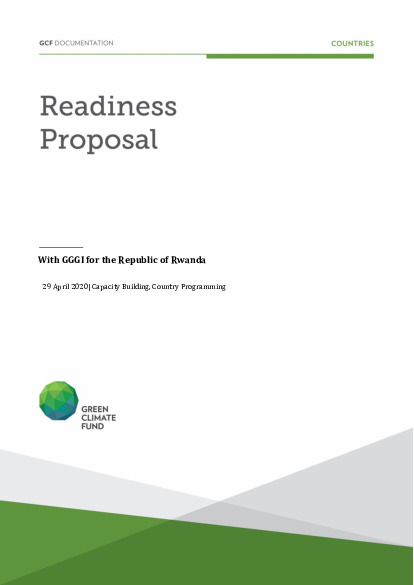Readiness Support to Capacitate Rwanda’s Subnational Level Actors in Green Growth and Climate Resilience

Readiness Support to Capacitate Rwanda’s Subnational Level Actors in Green Growth and Climate Resilience
This proposal seeks to increase the capacity of Rwanda Government’s Thematic Sector Working Groups (TSWGs) with a focus on strengthening their functions and activities to inform sub-national level actors on green growth and climate resilience that will lead to the delivery of climate actions in their respective sectors, subsectors, and communities. This will ensure that the proposal outcomes and outputs benefit the critical mass of society whose role is to implement government policies, strategies and projects on the ground. The overall results will lead to successful implementation of key national strategies and plans including the Seven Year Government Programme: National Strategy for Transformation (NST1, 2017/2024), Sector Strategic Plans (SSPs, 2018/2024), District Development Strategies (DDS, 2018/2024) and the Green City Development Master Plans (2019-2050). These strategies and plans are aligned with the Green Growth and Climate Resilience Strategy (GGCRS) and Nationally Determined Contributions (NDCs) to stimulate green economic development and green investment in Rwanda’s secondary cities and others emerging urban centers1.
With this background and building on the results of previous Readiness Support to Rwanda, there is an urgent need to capacitate the project and program planners as well as the last mile implementers and beneficiaries to understand and integrate climate resilient development in their daily work. For instance, the adopted Green Building Minimum Compliance System2 supports the realization of low carbon urban development promoted by the revised master plans of the secondary cities. However, this system and related requirements need to be embraced, understood and applied by practitioners and investors. The broad capacity gaps include i) low coordination capacity at the TSWG to integrate or mainstream climate resilient development into plans and implementation; ii) low awareness and lack of targeted skills on climate resilience by the last mile implementers of programs and projects at subnational level; and iii.) insufficient capacity to monitor and verify investments through the traditional budgeting system.
The focus on capacitating sector platforms and thematic areas is also aimed at reaching out to different groups, associations and institutions at the sub-national level in the thirty (30) Districts of Rwanda. In addition, guidance, tools and modules that will ensure readiness and awareness to design, implement and monitor green growth and climate resilient projects will be at the heart of this project. This includes the upgrading of the existing Rwanda Climate Portal 3 and establishment of portal users forum from environment sector development partners and stakeholders4, to serve as main source of climate data and information in Rwanda. The proposed project presents an opportunity towards building stronger linkages and collaboration amongst the different sector stakeholders whose role is to implement government plans and policies.
The Government of Rwanda, under the Economic Development and Poverty Reduction Strategy (EDPRS) medium term planning process, established the sector working groups and the related thematic groups with the aim to coordinate all government plans, policies and strategies to ensure ownership and efficient implementation of projects. This set up has yielded results in the form of providing a platform for different stakeholders to discuss, plan and integrate their prioritized sector actions before approval and implementation. However, past joint sector reviews by the government has shown that while improvements have happened in the delivery and meeting of the set targets by the different sectors (e.g. Urbanization, Agriculture, Industries, Tourism, Energy), there is still low capacity to mainstream green growth and climate resilience into the sector strategy implementations. This implies that more efforts are needed to develop the readiness and capacity of the relevant stakeholders within the evolving framework of the government’s Vision 2050 and the National Strategy for Transformation (NST1) to shift towards climate resilient and sustainable economy. Increasing the capacity for coordination will need skills transfer and knowledge and best practice exchange in this platform. The timing of this proposal is very crucial in strengthening sector level capacity and coordination for the effective mainstreaming of climate resilience and green growth into the planning and budgeting processes aligned with Rwanda’s fiscal calendar. Rwanda’s economy depends heavily on environment and natural resources, and as such, it is imperative that the readiness of Rwandan citizens is enhanced to tackle environmental degradation, pollution, unsustainable management of natural resources and climate change risks which are major obstacles to addressing poverty, inclusive growth and sustainable economic development.